Aging can be a beautiful thing, and it is ultimately something we can be grateful for as proof that we get to live another day. But, let's face it—some days, getting older can be a real drag. Your body undergoes many types of changes, both externally and internally, and this can be a frustrating experience, especially because aging can be a risk factor for many different diseases. Thankfully, there are superfoods you can eat regularly to help slow down this process.
"Superfood" is a term that gets thrown around quite often, but what does it actually mean? According to the Cleveland Clinic, there isn't a clear way of determining what is and what isn't considered a superfood, but it is essentially anything that provides many different nutrients and stays on the lower end of calories. While superfoods are great to include in your diet at any time, there are specific choices that contain nutrients related to slowing down the aging process.
"Some of our nutritional needs can change as we age, so including some specific superfoods in your diet may help people live a healthy life as they get older," says Lauren Manaker, MS, RDN, registered dietitian and author of The First Time Mom's Pregnancy Cookbook and Fueling Male Fertility.
We were curious about what these specific superfoods would be, so we asked a couple of our experts to weigh in. And even though there are plenty of superfoods to help slow aging into your 50s, 60s, 70s, and beyond, we wanted to focus specifically on the years after you turn 40. For one, your 40s are the perfect time to start setting healthy habits so that you can take these changes into your later decades. Also, your body does start to undergo specific changes in your 40s, such as muscle mass loss, hormone changes related to menopause, and shifts in your height related to bone and muscle changes.
Read on to learn about some of the superfoods our dietitians recommend to start implementing into your diet while you're in your 40s to slow aging.
Blueberries
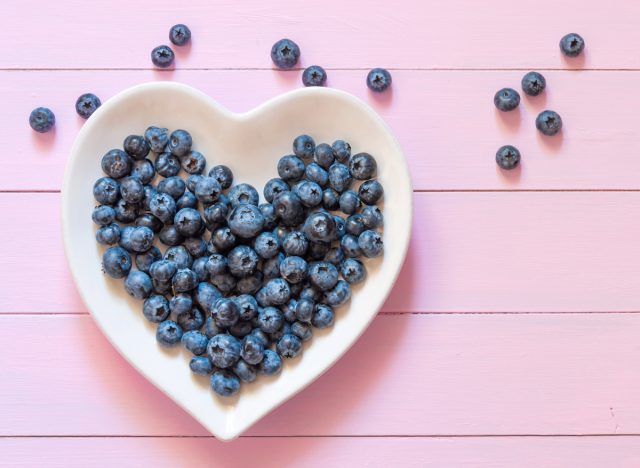
Berries are one of the healthiest foods you can eat as you age, with blueberries being a major star of the pack.
For starters, Mary Sabat MS, RDN, LD notes that "Blueberries are packed with antioxidants called flavonoids, which help combat oxidative stress and inflammation, two major contributors to aging."
Lisa Young, PhD, RDN says "Consumption of blueberries also supports brain health and may delay cognitive aging." Sabat agrees, adding that these berries have been found to help prevent dementia, Alzheimer's, and age-related cognitive decline "due to their high levels of antioxidants (specifically flavonoids), which have been shown to improve cognitive function and reduce the risk of neurodegenerative diseases."
You may think your 40s feel too young to start focusing on dementia and Alzheimer's prevention, but it's never too early to regularly consume healthy foods like blueberries that can help your body as you continue to age.
As mentioned earlier, your 40s are a time when you may begin to notice changes in the strength of your muscles, and research shows that blueberries can help with this. According to the journal Scientific Reports, blueberries helped improve muscle recovery and lower damage and soreness after workouts.
Strawberries
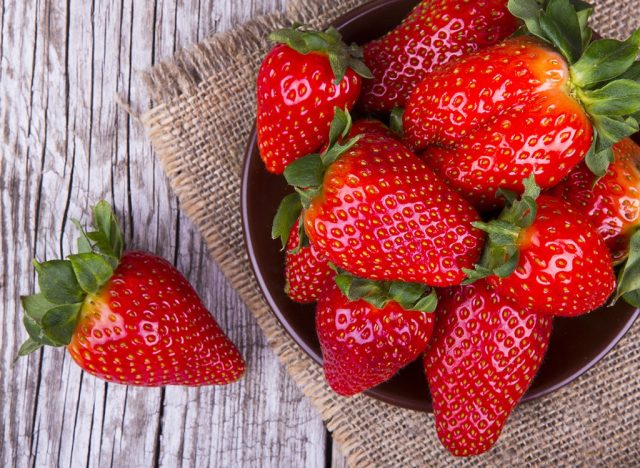
"Strawberries are a source of vitamin C and plant compounds," says Manaker, which are components that give strawberries their superfood, anti-aging properties.
According to research published in the Journal of Alzheimer's Disease, getting adequate vitamin C can help protect you against age-related cognitive decline. They go a step further by saying that eating a balanced diet and getting vitamin C through your foods can be more effective than supplementing this nutrient.
"Some data also shows specifically that eating berries more than twice a week may delay cognitive aging by up to 2.5. years," says Manaker.
Young adds that "berries may also help protect our cells from free-radical damage and reduce the risk for heart disease and cancer, as well."
Avocado
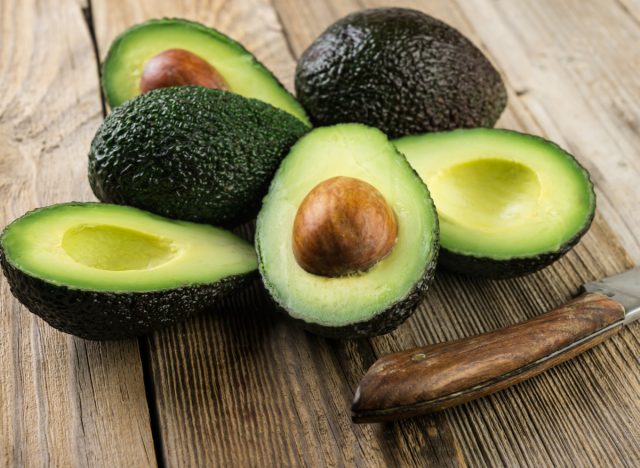
Research shows that many people begin to lose elasticity in their skin and notice skin aging signs sometimes as early as their 20s. This is because as we get older, our body begins to produce less collagen and elastin, which impacts the texture and youthfulness of our skin. These changes are natural and nothing to be feared, but if you're looking for healthy ways to potentially bring back some of that elasticity, your diet can help.
According to Sabat, one of the best superfoods to eat for your skin is avocado. "Avocados are rich in healthy fats, particularly monounsaturated fats, which help nourish the skin and reduce inflammation, promoting a more youthful appearance," she says.
Young adds that along with healthy fats, avocados contain vitamin E, "which can help reduce inflammation, promote healthy aging, and help enhance skin health by repairing damaged skin and increasing collagen production."
Almonds
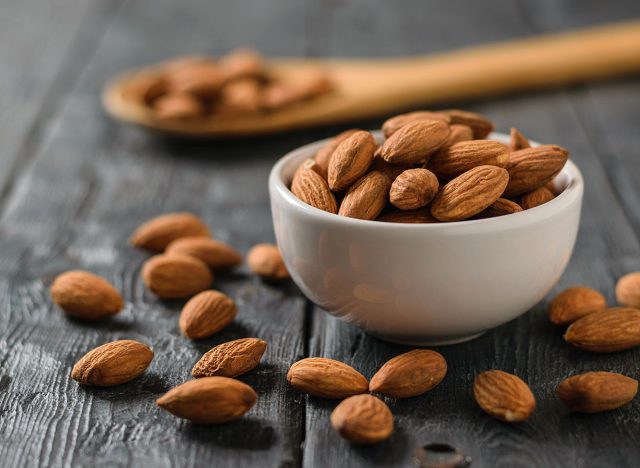
Speaking of youthful skin, Sabat also includes almonds on the list of the best superfoods for aging.
"Almonds are rich in vitamin E, an antioxidant that helps protect the skin from UV damage and promote skin repair and regeneration," she explains. And in one study published in Phytotherapy Research, post-menopausal women who consumed almonds as a daily snack saw, on average, greater reduction in wrinkle size and intensity on their skin.
Pomegranate
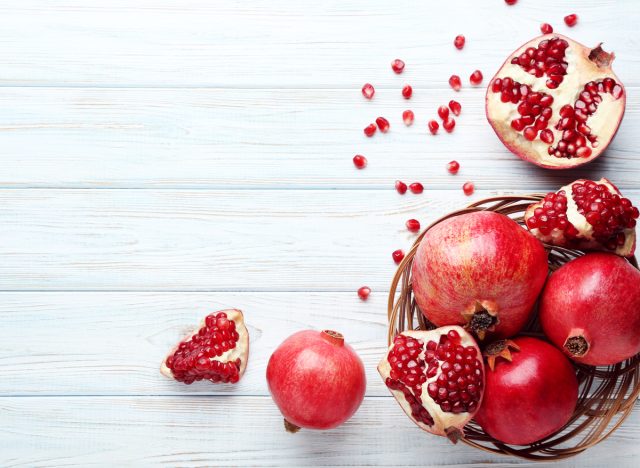
Pomegranates are antioxidant-rich fruits that have been linked to reducing heart disease risk factors, improving brain health and cognition, and helping to protect your skin as you age. Sabat says, "This fruit is rich in antioxidants called polyphenols, which help protect the skin from UV damage, reduce inflammation, and promote collagen production, improving skin texture and elasticity."
So, whether you're eating the pomegranate arils (the seeds) or drinking 100% pomegranate juice, you'll get these amazing antioxidant benefits for your aging skin, heart, and brain.
Turmeric
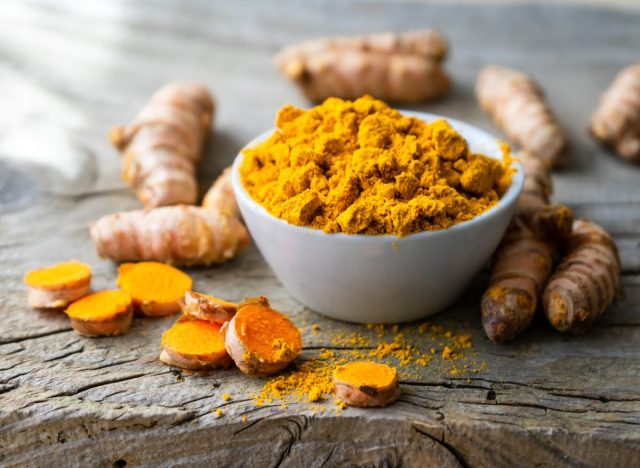
Whether you're making a golden latte with it or using it as a spice in your favorite dish, turmeric is a superfood that has been linked to anti-aging benefits.
One study published in the journal Molecules found positive results with using turmeric as a supplement for middle-aged men and post-menopausal women, noting that it carried strong protection against oxidative stress damage.
Sabat adds that "turmeric contains a compound called curcumin, which has potent anti-inflammatory and antioxidant properties, helping to protect against age-related diseases and promote overall health and longevity."
Pistachios
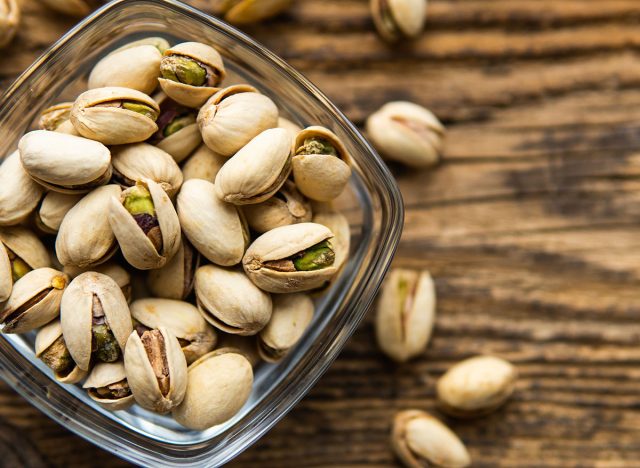
"Free radicals attack healthy body cells, and this damage is thought to contribute to inflammation and the build-up of oxidative stress," says Manaker. "Collectively, this can accelerate aging at the cellular level, while also playing a foundational role in promoting chronic health conditions, including heart disease and cancer. Health professionals recommend antioxidant-rich foods to help protect healthy cells from free radical damage in the body."
Manaker tells us that pistachios are one of the foods known to help fight these free radicals by way of their antioxidant capabilities. "A study conducted by Cornell University and published in the journal Nutrients found that pistachios have a high-antioxidant capacity, with the antioxidant capacity of pistachios rivaling that of popular antioxidant-containing foods, including blueberries, pomegranates, etc."
"Data shows that eating just a handful of pistachios as part of a regular diet can positively affect cellular aging and longevity among those with pre-diabetes," adds Manaker. "And, pistachios also contain lutein, an antioxidant carotenoid that helps support eye health."
Salmon
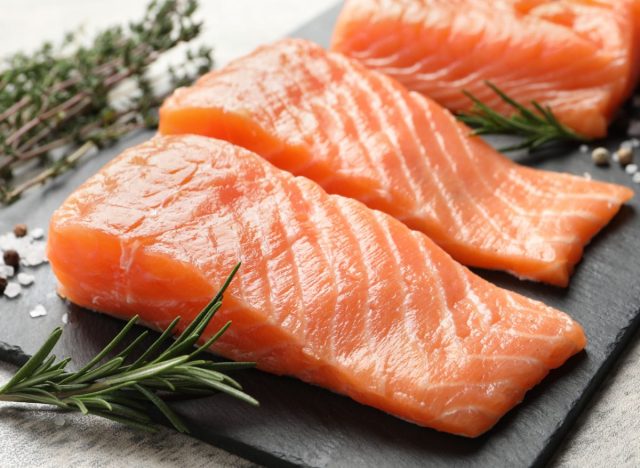
Another wonderful superfood to help slow the process of aging is salmon, as well as many other types of fatty fish. "Salmon is an excellent source of lean protein, a nutrient important for maintaining muscle mass, and is especially important for older adults," says Young. "It's also rich in omega-3 fatty acids, which can lower the risk of heart disease."
In fact, one study published in Neurology found that those in their 40s and 50s whose red blood cells contained higher levels of omega-3s had better cognitive functioning and overall brain structure than those who had lower omega-3 counts.
Cranberries
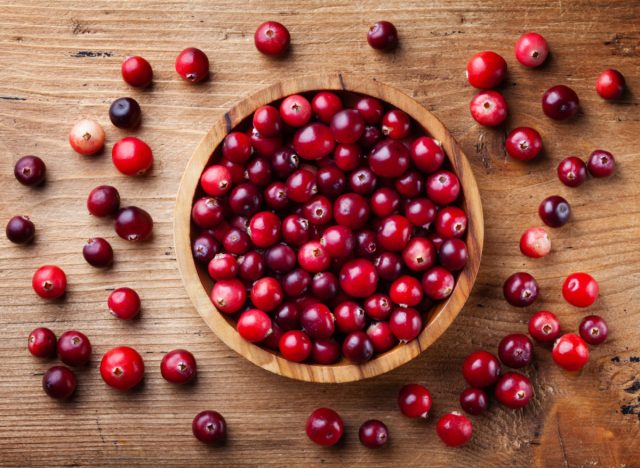
If you're a fan of cranberries or cranberry juice, you're in luck, because this superfood has been found to help slow aging.
"Cranberries are packed with plant compounds that may help slow the aging process, especially when focusing on cognitive aging," says Manaker. "Data shows that consuming what is equivalent to one small cup of cranberries every day over three months may improve memory performance and neural functioning."
On top of the cognitive-related benefits this fruit can offer you, "Cranberries are also a source of vitamin C, a nutrient that may help combat the effects of free radicals on aging skin," says Manaker.
Tomatoes
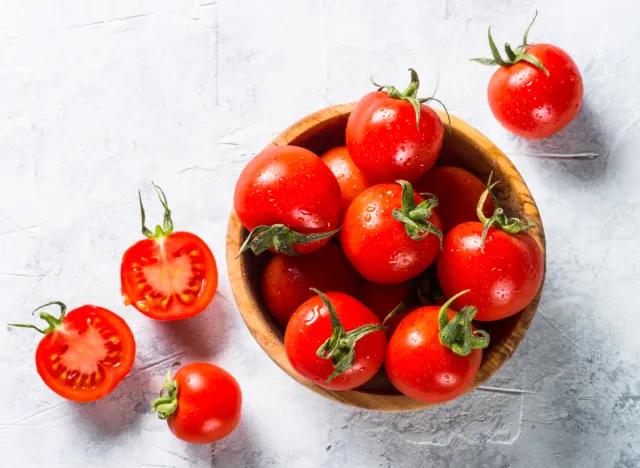
According to Young, tomatoes are an important superfood to help slow aging. "Certain red foods, such as tomatoes, contain the antioxidant lycopene, which fights free radicals that come with aging," she says. Lycopene, which is a plant compound found also in watermelon and pink grapefruit, is known for its multitude of health benefits.
Along with fighting free radicals, high lycopene intake has been found to help lower cholesterol, improve cardiovascular health and help reduce the risk of heart disease, help lower the risk of stroke, and even help reduce the risk of prostate cancer in men. And, in addition to all of these benefits against age-related diseases, lycopene is known to help reduce skin photo damaging.
Dark Leafy Greens
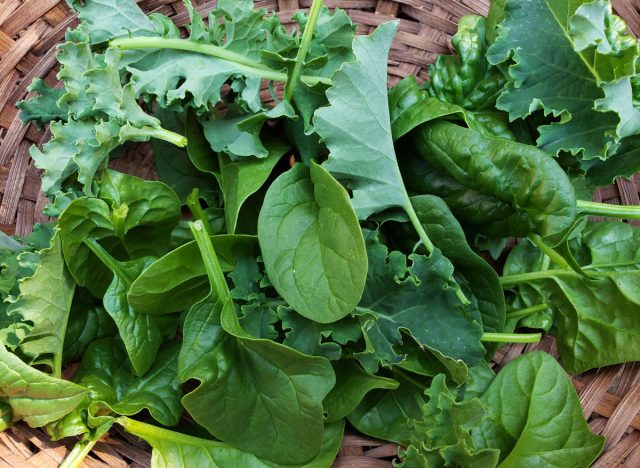
"Leafy greens such as kale and spinach are rich in vitamins E and K, which may prevent memory loss and help reduce how much our brain ages," says Young.
Research certainly backs this up as well. In a study published by the American Academy of Neurology, it was concluded that one serving of leafy greens a day was associated with less age-related cognitive decline, not only because of their vitamin K content but because of their antioxidant plant compounds like lutein and beta carotene, and their levels of nutrients like folate and nitrate.
But the benefits of dark, leafy greens don't stop there. Not only do dark leafy greens help your cognitive health as you age, but according to Young, "These greens contain carotenoids, which may help protect the eyes against oxidative damage, and spinach specifically is also rich in antioxidants vitamins A and C, which can help protect the heart."
No comments:
Post a Comment